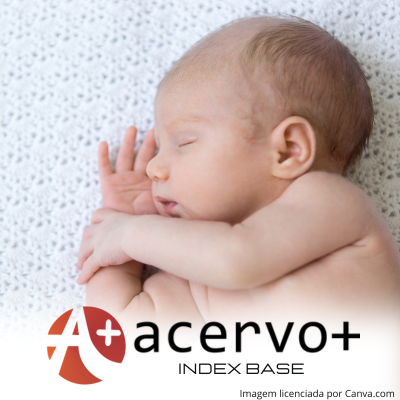Cuidado domiciliar do recém-nascido pós-alta da Unidade de Terapia Intensiva Neonatal (UTIN)
##plugins.themes.bootstrap3.article.main##
Resumo
Objetivo: Analisar as principais estratégias para o cuidado domiciliar do recém-nascido após a alta da Unidade de Terapia Intensiva Neonatal (UTIN). Métodos: Trata-se de uma revisão integrativa da literatura científica, com busca nas bases de dados PubMed, SciELO, LILACS e Scopus, abrangendo o período de 2019 a 2024, sem restrição de idioma. Foram utilizados os descritores “Neonatal care”, “Newborn” e “Hospital discharge”, adotando critérios rigorosos de inclusão e exclusão para assegurar a qualidade das evidências selecionadas. Resultados: Os dados analisados evidenciaram que planos de alta bem estruturados, educação prática para os pais e suporte multiprofissional contínuo são fundamentais para uma transição segura ao domicílio. Ademais, tecnologias digitais, como a telemedicina, mostraram-se eficazes na redução das taxas de reinternação e na melhoria dos desfechos clínicos desses recém-nascidos. Considerações finais: Pode-se considerar que intervenções planejadas, associadas ao acompanhamento multiprofissional e ao uso de ferramentas tecnológicas, são essenciais para garantir o cuidado integral e seguro do recém-nascido prematuro no ambiente domiciliar.
##plugins.themes.bootstrap3.article.details##
Copyright © | Todos os direitos reservados.
A revista detém os direitos autorais exclusivos de publicação deste artigo nos termos da lei 9610/98.
Reprodução parcial
É livre o uso de partes do texto, figuras e questionário do artigo, sendo obrigatória a citação dos autores e revista.
Reprodução total
É expressamente proibida, devendo ser autorizada pela revista.
Referências
2. CHAWANPAIBOON S, et al. Global, regional, and national estimates of levels of preterm birth in 2014: a systematic review and modelling analysis. The Lancet Global Health, 2019; 7(1): 37-46.
3. DELAGO M e CARVAJAL B. Coping in mothers of premature newborns after hospital discharge. Newborn and Infant Nursing Reviews, 2016; 16(3): 105-109.
4. FRANCK LS e ALDERDICE F, et al. The perinatal-neonatal care journey for parents of preterm infants: what is working and what can be improved. Journal of Perinatal & Neonatal Nursing, 2017; 31(3): 244-255.
5. FROTA MA, et al. Alta hospitalar e o cuidado do recém-nascido prematuro no domicílio: vivência materna. Escola Anna Nery, 2013; 17(2): 277-283.
6. HARRISON W e GOODMAN D. Epidemiologic trends in neonatal intensive care, 2007-2012. JAMA Pediatrics, 2015; 169(9): 855-862.
7. HEBBALLI NB, et al. Barriers to transition to home from the neonatal intensive care unit: A qualitative perspective of parents and healthcare providers. Journal of Perinatal & Neonatal Nursing, 2021; 35: 340-349.
8. IJB. INSTITUTO JOANNA BRIGGS. Joanna Briggs Institute Reviewers’ Manual: 2020. The Systematic Review of Evidence Implementation. Adelaide: JBI, 2020; 211.
9. LAKSHMANAN A, et al. Designing a mobile health solution to facilitate the transition from NICU to home: A qualitative study. Children, 2022; 9: 260.
10. MENDES KDS e GALVÃO CM, et al. Revisão integrativa: método de pesquisa para a incorporação de evidências na saúde e na enfermagem. Texto & Contexto Enfermagem, 2008; 17(4): 758-764.
11. MILLER K, et al. Neonatal therapy principles during transition from neonatal intensive care unit to home: A modified Delphi study. Developmental Medicine and Child Neurology, 2024.
12. MOUSAVI SS, et al. The need for support and not distress evoking: a meta-synthesis of experiences of Iranian parents with premature infants. Iranian Journal of Psychiatry and Behavioral Sciences, 2017; 11(4): 5916.
13. NORTON M e HAGSTROM A. Finding a new normal: Maternal experiences transitioning to home from the neonatal intensive care unit caring for technology-dependent infants. Journal of Neonatal Nursing, 2021.
14. OSORIO GALEANO SP e SALAZAR MAYA AM. Preparing parents for discharge from the neonatal unit, the transition, and care of their preterm children at home. Journal of Neonatal Nursing, 2023.
15. SANTOS RV e PENNA CMM. Educação em saúde como estratégia para o cuidado à gestante, puérpera e ao recém-nascido. Texto & Contexto Enfermagem, 2009; 18(4): 652-660.
16. SILVA RA e FERREIRA ML. High-risk newborns: post-discharge follow-up and its impact on neonatal morbidity and mortality. Journal of Neonatal Nursing, 2019; 25(4): 300-306.
17. SMITH VC e STEWART J. Discharge planning for high-risk newborns. UpToDate, 2019.
18. SPENCE CM, et al. Parent experiences in the NICU and transition to home. Journal of Perinatal & Neonatal Nursing, 2023.
19. THOMAS BH e MICHEL C, et al. A process for systematically reviewing the literature: providing the research evidence for public health nursing interventions. Worldviews on Evidence-Based Nursing, 2020; 17(6): 394-401.
20. WANG L e FEI SL, et al. Perceived Needs of Parents of Premature Infants in NICU. Western Journal of Nursing Research, 2018; 40(5): 688-700.

